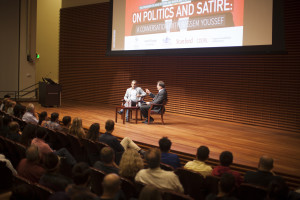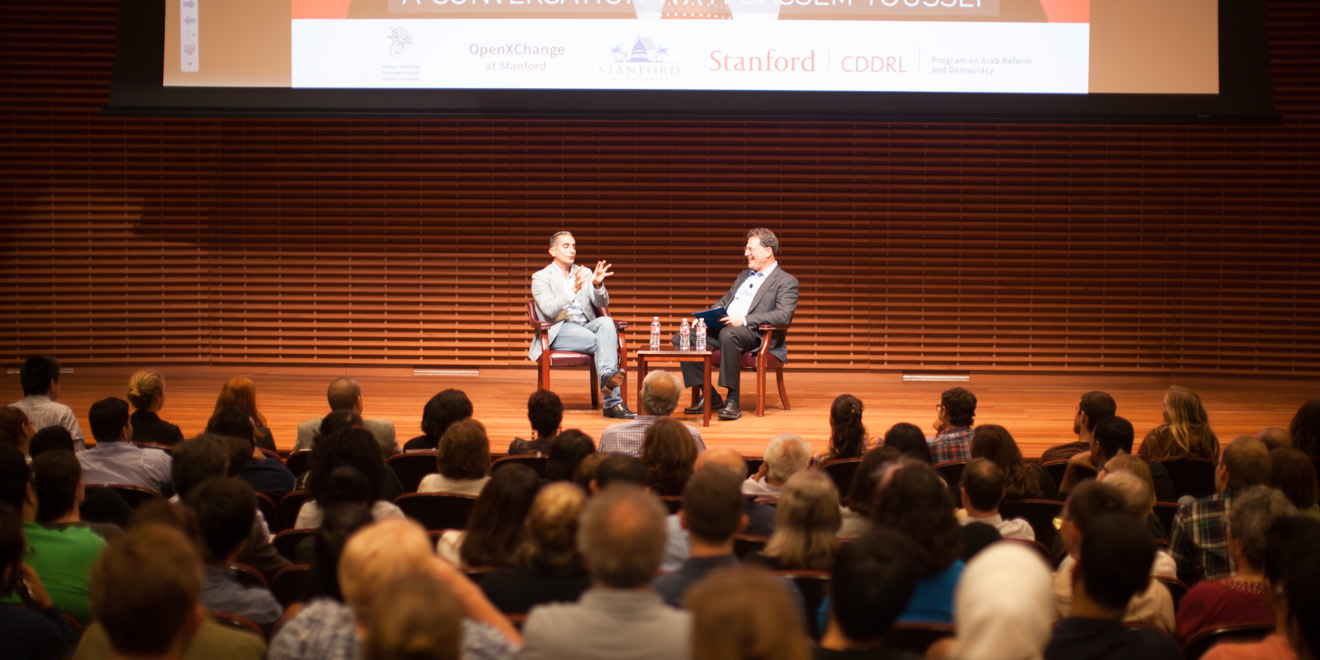On Monday night, Egyptian political satirist Bassem Youssef spoke at CEMEX auditorium in an event co-sponsored by the Center on Democracy, Development and the Rule of Law (CDDRL) and OpenXChange, a new year-long program designed to promote on-campus dialogue. The talk was moderated by Larry Diamond, former director of the CDDRL and senior fellow at the Freeman Spogli Institute for International Studies.

“Imagine Jon Stewart in the 16th century, talking about the Pope,” Youssef said.
Widely known as “the Arab Jon Stewart,” Youssef rose to fame after uploading a series of satirical videos during the 2011 Egyptian Revolution that overthrew Hosni Mubarak’s 30-year rule. The videos gained immense popularity on his YouTube channel and earned him a contract with a major Egyptian TV network to host “Al-Bernameg,” which later would become tantamount to Egypt’s “The Daily Show.”
In response to Diamond’s question on how he decided to embark on the road of political comedy after graduating from medical school, Youssef responded with his signature touch of humor.
“I had a TV deal in one hand and the offer from Cleveland [Clinic] in the other hand, and this was what I was working [on] for all of my life,” Youssef said. “I studied and worked [for] 20 years in medicine. Should I save lives and do my message as a doctor, or should I keep the money? And I did keep the money.”
Self-deprecating jokes aside, Youssef attributed his actual motivation to the huge disparity between reality and the propaganda in official media sources.
“You would think that everybody thought there was a revolution, but on state-run media, it was a conspiracy – like everything in the Middle East, of course,” Youssef said. “It was a conspiracy carried out by, collectively, the United States, Israel, Hamas, Qatar, Turkey and Syria – as if the Egyptian revolution has kind of united the world to accomplish world peace.”
He soon discovered that hosting a satirical show in Egypt at a time of unprecedented political instability was no easy task.
In 2013, Youssef received an arrest warrant for “propagating false news,” “insulting Islam” and “defaming Mohammed Morsi,” who was elected president of Egypt after the downfall of Mubarak. His short detainment elicited worldwide sympathy, and Jon Stewart openly expressed support for Youssef in a “Daily Show” episode.
“One of the challenges we had to face was that we had one of the biggest taboos that we have to deal with, which is now we have some sort of religious authority.” Youssef said. “And if you come from the Middle East, religion is something very big.”
Domestic pressure persisted. Later in 2013, the TV network suspended “Al-Bernameg,” and after cooperating with another broadcasting company for a brief period, Youssef announced that he had to terminate the show due to the country’s dangerous political climate.
Youssef commented on the disillusion after the initial exhilarating period following Mubarak’s stepping down, and he traced the failure of the revolution to “one single date — March 19, 2011,” when the constitutional referendum took place.
According to Youssef, after the hasty resolution passed with a landslide majority – despite the hidden divide within Egyptian society – the Muslim Brotherhood, with which Morsi was affiliated, became the only organized political power which therefore quickly seized power.
But in July 2013, Morsi was detained in a military coup and was subsequently sentenced to death, a court decision condemned by the human rights group Amnesty International.
Despite the drastic changes in the Egyptian political scene since the inception of “Al-Bernameg,” Youssef does not believe that his show was the main reason the country’s political climate shifted.
“At the end of the day, it was a comedy show,” Youssef said. “I was not someone who was the leader of the people or telling them what to do. I just expressed my opinions, and it was up to the people to do whatever they wanted.”
Youssef ended the conversation by describing the current Egyptian government as “an amazing regime if you’re a big fan of ‘1984.’” He said that he remains hopeful of the future.
“It’s really up to the people to make the change,” Youssef said.
An earlier version of this article incorrectly stated that the event was hosted by OpenXChange, while it was in fact co-hosted by the CDDRL. The version also stated that Mohammed Morsi had died. The Daily regrets these errors.
Contact Qitong Cao at qitong ‘at’ stanford.edu.
